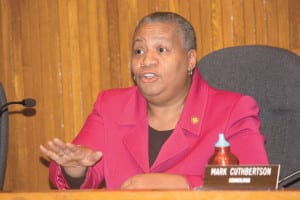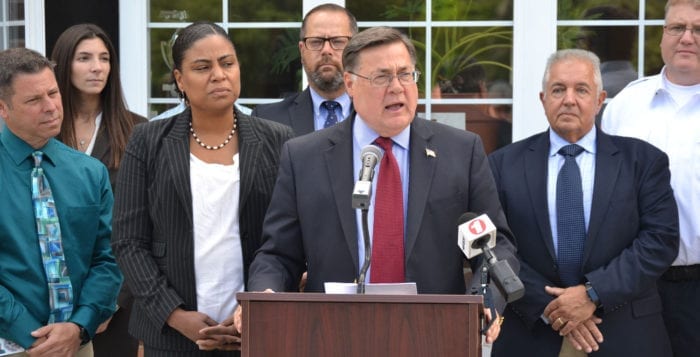By Rita J. Egan
Both candidates for Suffolk County sheriff will bring more than two decades of public service experience to the position if elected. The race does not feature an incumbent, as current Suffolk County Sheriff Vincent DeMarco announced in May he wouldn’t seek re-election after 12 years in the position. On Oct. 13, Republican candidate for sheriff Larry Zacarese and Democrat Errol Toulon visited the TBR News Media office to discuss their experiences and how they would handle the position if elected.
Zacarese, assistant chief of police and director of the office of emergency management at Stony Brook University since 2009, who is also an attorney, has been a New York City police officer and is currently a volunteer paramedic.
Toulon began serving as a correctional officer at Rikers Island in 1982 and retired as a captain in 2004. For two years he was assistant deputy county executive for public safety in Suffolk and in 2014 he was named deputy commissioner of operations for the New York City Department of Corrections.
“I’ve been able to learn a lot on various levels inside of a correctional agency, and while that’s not the entire makeup of the sheriff’s department, it is a good portion of it.”
— Errol Toulon
Toulon said he feels from day one he would be able to manage the sheriff’s office effectively and will attempt to save taxpayers’ dollars through technology training and equipment.
“I’ve been able to learn a lot on various levels inside of a correctional agency, and while that’s not the entire makeup of the sheriff’s department, it is a good portion of it,” Toulon said.
Zacarese said he believes his experience would be an asset, especially with a need for capital planning, budgeting and managing grants in today’s tough economic climate, he said.
“My role as an emergency manager at Stony Brook is really broad based,” Zacarese said. “Not only am I involved in the day-to-day operations, planning, mitigation and response and recovery, but I oversee an office that handles all the electronic physical security, design, installation and maintenance for the entire campus, which is over 250 buildings.”
Both cited combating gang activities on Long Island as a priority for the next sheriff.
Toulon said his team at Rikers would gather intelligence from inside the jail as far as calls, visits and social media interactions before incarceration and then would work with law enforcement agencies to gather and disseminate the information. According to him, his team’s work brought down 37 members of the Bloods gang. He said using a database to collect intelligence gathered and sharing it with other agencies is vital in rounding up gang members, and he said he thought his experiences could translate seamlessly to the Suffolk position.
Zacarese is also familiar with combating gang problems. A case he worked on while at a precinct in Jackson Heights involved the investigation of narcotics trafficking by members of the Latin Kings. He said the county lost critical ground in the fight against gangs when the FBI removed two Suffolk County police detectives assigned to the bureau’s joint Long Island Gang Task Force by James Burke, former police department chief, who was found guilty of beating up a suspect and trying to cover it up.
“I have already had conversations and meetings with Homeland Security investigations, with people on the U.S. Marshals’ task force and making sure we have enough people on those task forces,” Zacarese said.
Toulon agreed with Zacarese that in addition to disseminating information, manpower is important.
“Task forces are very important, and keeping our members on these task forces is extremely important,” Toulon said.
“I have already had conversations and meetings with Homeland Security investigations, with people on the U.S. Marshals’ task force and making sure we have enough people on those task forces.”
— Larry Zacarese
The candidates touched on the subject of cooperation with Immigration and Customs Enforcement. Both said while the sheriff’s office doesn’t get involved with immigration issues, it’s important to cooperate with the federal agency. Zacarese said many illegal immigrants are held in jails due to being violent predicate felons and people who return to the country illegally after being deported. The two also agreed it’s important for law enforcement agencies to increase communication with immigrant communities to ensure law abiding citizens do not fear deportation from ICE agents, which makes building cases against gang members more difficult.
Both candidates said they want to work on getting more help for those with substance abuse problems while incarcerated, which may decrease the chances of being arrested again.
“There are people who are leaving the correctional facility without so much as a business card for a social worker or any outreach programs [now],” Zacarese said.
Toulon said while substance abusers are seen by a medical staff to be treated, he agreed when prisoners leave the jail, they need assistance with finding housing and jobs.
“What I propose is creating a resource map so in each particular town we would know where those particular resources are for an individual so when we give them a card or give them the information they would be able to connect and have someone in the sheriff’s they can call and be that conduit,” Toulon said.
Both agreed that combating the drug problem, especially opioid overdoses, needs to be a priority in the county. Better tracking of overdoses; where they are happening, how they’re happening and deaths due to overdoses to identify where people need help, were areas each candidate brought up as meaningful first steps. Zacarese said he believes in enforcing the laws on the books and “strict enforcement for the suppliers, help for the people who are there in the middle and giving them long-term treatment options.”
Toulon pointed out that increasing monitoring of physicians who dispense pain management is also needed and fostering communication with communities “to actually acknowledge the problem that our family and friends are having so that we can get the correct treatment for them.”

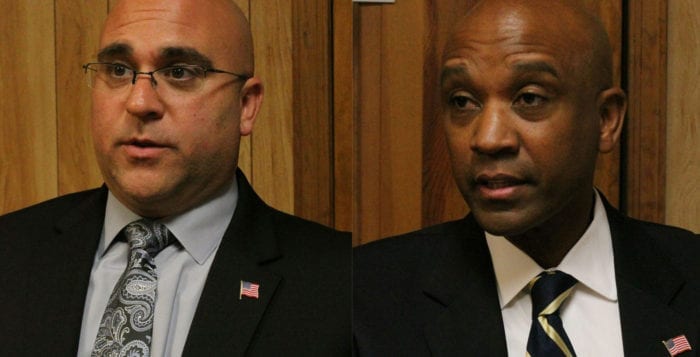



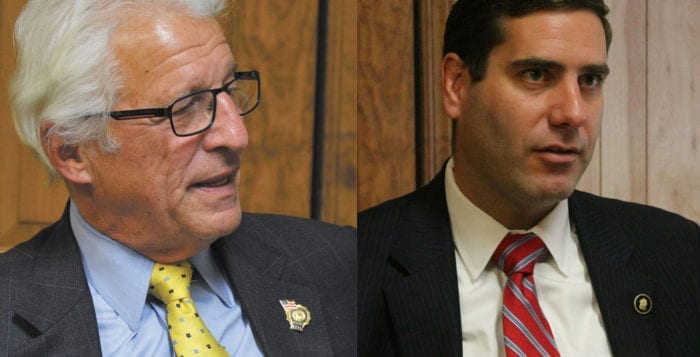
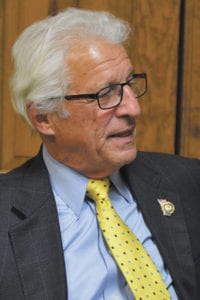

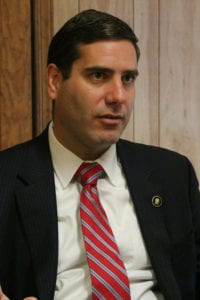
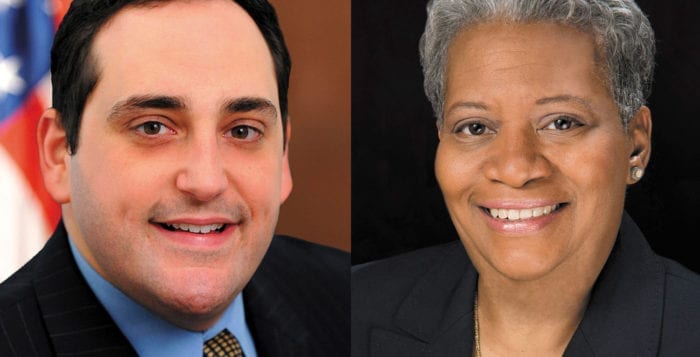
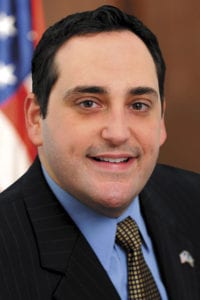



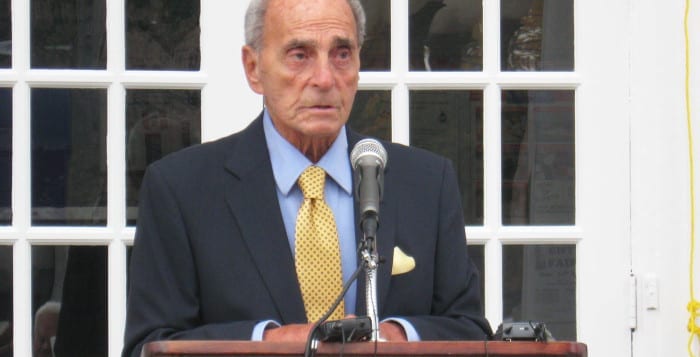

 Lisa Scott is the president of the League of Women Voters of Suffolk County, a nonprofit, nonpartisan organization that encourages the informed and active participation of citizens in government and influences public policy through education and advocacy. For more information, visit www.lwv-suffolkcounty.org, email
Lisa Scott is the president of the League of Women Voters of Suffolk County, a nonprofit, nonpartisan organization that encourages the informed and active participation of citizens in government and influences public policy through education and advocacy. For more information, visit www.lwv-suffolkcounty.org, email 
